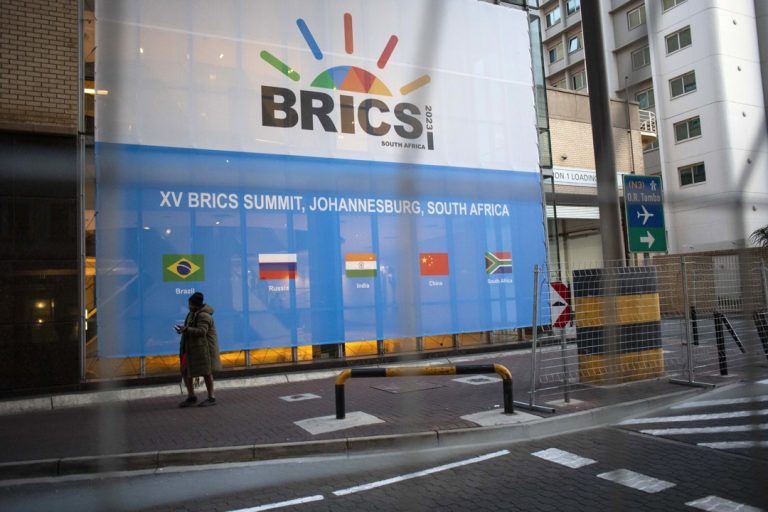22 de agosto 2023

Children of Exile: The Births “Sowing Hope” in the Camp of Nicaraguan Farmers

PUBLICIDAD 1M
PUBLICIDAD 4D
PUBLICIDAD 5D
China has used the "BRICS Bank" to help Russia try to circumvent the sanctions imposed on it by the EU and the US.

A man walks past a banner near the 15th BRICS Summit, at the Sandton Convention Centre, Johannesburg, South Africa. Photo: EFE
China is determined to broaden the scope of the BRICS coalition to compete with the G7. BRIC was founded in 2006, and South Africa only joined the alliance in 2010. However, more than 20 other nations, including Saudi Arabia, Argentina, Belarus, Iran, Indonesia, and Venezuela, have expressed interest in becoming members.
Over 60 heads of state and government have been invited to attend a summit in Johannesburg, starting from Wednesday. The bloc may also welcome new countries as part of its membership. While Xi Jinping will be present for the event, Vladimir Putin will not attend due to an arrest warrant issued by the International Criminal Court.
Ahead of the summit, India and China have had differences of opinion. Indian officials firmly assert that BRICS should not be a coalition of nations openly opposed to the West, particularly the United States. In June, Indian Prime Minister Narendra Modi and US President Joe Biden held discussions in Washington DC to reinforce defense and technology collaboration between their countries, notwithstanding ongoing concerns about human rights in India.
Washington's strategic focus has been on elevating India as a counterweight to China, resulting in the sidelining of other intricate bilateral matters. Meanwhile, Modi endeavors to expand India's global influence while preserving its independence from China's agenda.
China is determined to bolster the BRICS and ensure it holds a comparable share of global GDP as the G7. The NBD will be further propelled as a viable substitute for the IMF and World Bank. It's worth noting that over 60% of the loans sanctioned by the NDB are in dollars.
China's claim of neutrality is a façade for its true intentions of strengthening its anti-Western bloc. The General Secretary's visit to Russia in March 2023 only confirms China's underhanded tactics. Despite stating that it will not provide military equipment to Russia, China has continued to supply tens of thousands of military equipment to Russian manufacturers, including helicopters, drones, optical sights, and key metals for military purposes. These actions are unacceptable and must be addressed immediately.
Similarly, China's public position is that its interest in strengthening the BRICS is not part of an anti-Western strategy, but actions speak louder than words. China has also used the BRICS Bank to help Russia try to circumvent sanctions imposed on it by the European Union and the United States.
In addition to India, South Africa argues against proposing BRICS expansion as an anti-Western bloc. The South African president stated, "we will not get involved in a competition between global powers". However, the addition of countries with a frontal anti-American policy, such as Venezuela and Iran, would weaken their position and signify China's progress towards unifying the Western counter-power bloc.
This article was originally published in Spanish in Confidencial.
PUBLICIDAD 3M
Politólogo, académico y activista político nicaragüense. Fue secretario general del Ministerio de Defensa y director de Protección Civil durante la Presidencia de Enrique Bolaños. Es codirector fundador del Instituto de Liderazgo de la Sociedad Civil. Miembro de la opositora Unidad Nacional Azul y Blanco, exprecandidato presidencial, excarcelado político y desterrado por la dictadura orteguista.
PUBLICIDAD 3D